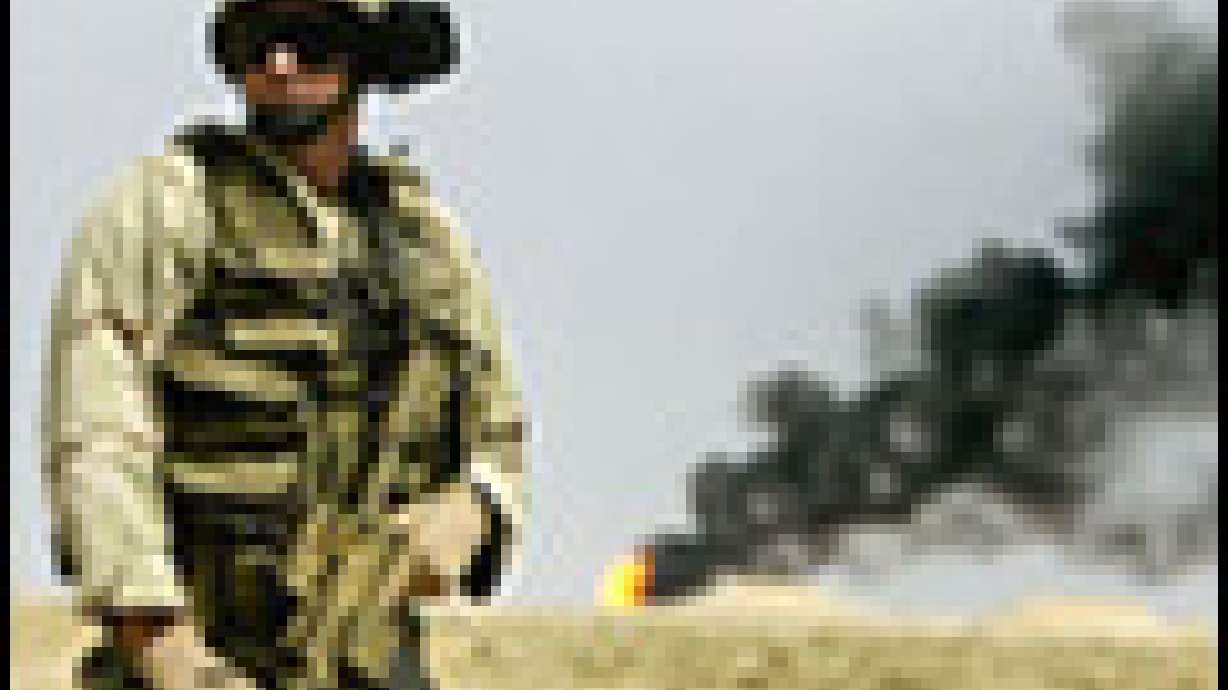Estimated read time: 4-5 minutes
This archived news story is available only for your personal, non-commercial use. Information in the story may be outdated or superseded by additional information. Reading or replaying the story in its archived form does not constitute a republication of the story.
KUWAIT CITY (AP) -- Firefighters attacking blazes at oil wells in southern Iraq say they've found telltale signs the valuable field was sabotaged. But it appears Iraqi troops may have disobeyed orders to blow up the wells or prepared explosives that were too weak to do serious damage.
It took Kuwaiti firefighters only 15 minutes and two water cannon Monday to snuff out the first fire quenched so far at a booby-trapped Iraqi oil well.
Even though fighting nearby forced some civilian firefighters to clear out of the region Monday, Kuwait's senior firefighter, Aisa Bouyabes, said he believes his team and others can douse the six remaining blazes in Iraq's Rumeila South oil field within two weeks.
Upon inspecting damaged well heads at several blast sites just across Kuwait's border with Iraq, the team discovered a telltale pair of black wires snaking away from each one.
"These are the same wires that were used in Kuwait to blow up our wells -- the same method exactly. I've seen it before. I inspected the wells in Kuwait immediately after the liberation," Bouyabes said by telephone from northern Kuwait.
Saddam Hussein's troops sabotaged more than 700 well heads in Kuwait's oil fields as they retreated from the emirate in the closing days of the 1991 Gulf War. The damage took more than two years and $50 billion to repair.
U.S.-led forces have made a priority in the current war of trying to secure Iraq's oil fields to prevent a repeat of that scorched-earth tactic. One vexing question is why so few of Iraq's 1,685 oil wells are burning, despite ample evidence that Iraqis took time to rig them for detonation.
Although it is far too early to be certain, initial evidence suggests that in the vast majority of cases, Iraqi troops might have disobeyed orders to blow up the wells, or set explosives that were too weak to do serious damage.
Bouyabes said he believed the Iraqis had placed an explosive charge several feet underground at the blazing well he visited just over a mile across Kuwait's border with Iraq. The result was a mangled well head and flames 35 feet high.
British Prime Minister Tony Blair told the House of Commons on Monday that Iraq's oil wealth was "mined and deep-mined at that.
Had we not struck quickly, Iraq's future wealth would even now be burning away."
However, the will needed to ignite a multitude of desert infernos has so far not measured up to Iraqis' apparently extensive effort to lay and wire up the charges.
"I don't think that the Iraqis ever really intended to blow these wells up and keep them burning forever," said Rob Laughlin, managing director of London brokerage GNI Man Financial.
Bouyabes said he inspected at least two other wells in Rumeila South that were damaged but not burning. They too had been rigged with black wire, and the direction of the blasts and the placement of sand bags around each well head were persuasive clues of sabotage, he said.
Yet, for some reason, the explosions at those sites weren't powerful enough to destroy the well heads and spark fires.
"Whoever put in the explosives did not want to repeat what happened in Kuwait," Bouyabes suggested. "This is just an assumption: I don't think Saddam had very good control over these guys."
Iraq has the world's second-largest proven crude reserves, and it will need revenues from oil exports to help pay for its postwar reconstruction.
U.S. Brig. Gen. Vincent Brooks, deputy director of operations at the Central Command in Doha, Qatar, said the absence of widespread damage in the oil fields was "a very important story for the future of Iraq."
Coalition forces had mounted operations to secure Rumeila South and the oil terminals on Iraq's Persian Gulf coast and on the al-Faw peninsula.
However, fighting around oil fields that U.S.-led forces had previously thought were secure drove away some civilian firefighters who were trying to tackle the blazing wells, an American firefighter said.
"It's not nearly as safe as they said it was," said Brian Krause of Texas-based Boots and Coots, an oil services company.
"We're kind of sitting ducks out there." U.S. Marines declared the Rumeila South oil fields unsafe for journalists to visit Monday, forcing the cancellation of a trip under Marine escort intended to give the media a firsthand view of the well fires.
"Coalition forces consider it to be secured. That doesn't meant that there's not still hostile fire going on in the region in small pockets of resistance," said Maj. Randi Steffi, a U.S. military spokeswoman.
Bouyabes, the Kuwaiti firefighter, said he planned to coordinate with Krause and other foreign specialists Tuesday. For now, his team is the only one with all its water cannons, tanker trucks and other equipment in place and ready to use.
"I would love to take a shot at putting out all the fires in Rameila South, but I don't want to get greedy and claim all the credit," he said. "The more teams that are involved, the faster we can put out the fires and stop an environmental disaster."
(Copyright 2003 by The Associated Press. All Rights Reserved.)









